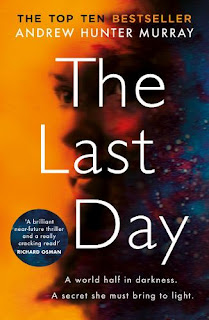The Last Day by Andrew Hunter Murray
Set in a dystopian near-future, Andrew Hunter Murray's The Last Day is a semi-political thriller that reminds me a bit of Robert Harris's Fatherland. But whereas Fatherland imagines a Britain in which the Nazis won the Second World War, The Last Day speculates on what would happen if the Earth literally stopped turning.
What that means, of course, is that one half of the world is scorched by endless sunshine and the other is shrouded in darkness and perpetually cold. The only part of the world that seems able to sustain human life and agriculture seems to be a slice of Europe, and Britain has become a primarily isolationist state. Coastal defences keep out potential refugee ships and the nation survives on food grown in 'the Breadbasket' - farms in mainland Europe tended by prisoners.
Eleanor Hopper, our protagonist, hasn't set foot on British soil for a long time - instead, she works on ocean rigs with the army, researching the sea currents that are part of the world's strange new climate. One day she receives a mysterious letter from Edward Thorne, her estranged university tutor and formerly a high profile government official. Thorne is has something important that he wants to tell her, but rapidly becomes clear that the totalitarian government would like to know about it too. Will Hopper ever discover Thorne's secret - information that threatens to change the world - or will the government's intelligence service beat her to it?
The premise of The Last Day is an intriguing and original one. It's telling that Britain has become a dictatorship more or less by default. There's been no revolution or sudden coup: Richard Davenport, who heads the government, has become the nation's despotic leader without resistance simply by being the man who was capable of seeing the country through the disaster of 'the Slow'. Draconian measures which are accepted during the emergency period - curfews, press censorship, rationing - become the basis of an authoritarian, totalitarian fascist state in which the hardships suffered by the people are exploited as justification for isolationism and the closure of Britain's borders. The few refugees who made it to Britain in the immediate aftermath of the Slow, are from the United States and are confined to an 'American Zone' where they're kept apart from the British and left to struggle for survival.
It's useful that Hopper is, to a degree, an outsider - during her years on the rig, she's become accustomed to regular meals, comparative safety and a structured, predictable way of life, so her observations make sense to us as a readers looking in on her world. I didn't, however, get much sense of Hopper as a person beyond the fact that she is tough and determined and an independent maverick, which isn't exactly groundbreaking stuff for a main character in an adventure thriller: at no point was in any doubt about what she would do next. While it's good to see a thriller of kind with a strong female lead, I occasionally found myself thinking I'd have preferred to learn more about Hopper's ex-husband, trying to come to terms with editing a newspaper under state control, at odds with all his journalistic instincts.
Andrew Hunter Murray's world-building is for the most part deftly executed, with enough detail to make The Last Day an immersive read. I did have some questions - for example, with Europe barely capable of growing enough crops to feed Britain, and the rest of the world either scorched to uninhabitable desert or freezing in perpetual darkness, how and where are people growing the tobacco for the characters' cigarettes? I also have no idea if the scientific theory behind Hunter Murray's set-up actually stacks up, but it's a setting that certainly makes for interesting reading. Hunter Murray excels at dropping in details that combine familiarity with a sense of doom and decay - the London Eye rots half-collapsed into the Thames - and the halting of the Earth's spin also means the loss of various technologies that we would take for granted, so despite being set in the future The Last Day has a slightly retro and faintly Orwellian feel to it.
Although I'm not sure the plot of The Last Day fully lives up to its concept, it's definitely a page-turner, with tension and jeopardy aplenty, and I'd happily read a sequel.

Comments
Post a Comment